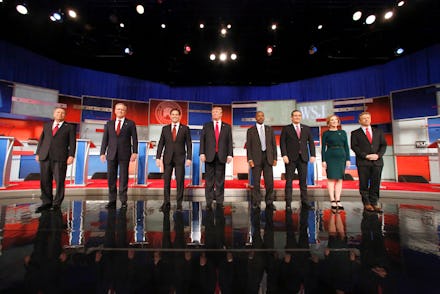2015 Fox Business Network Debate: Fact Checking the GOP Debate

To the casual wonk, Tuesday's Republican presidential debate brought plenty of convincing-sounding proclamations and fact-based arguments from the candidates. But in the Internet Age, even the most seasoned rhetorician cannot expect to outwit the seekers of truth. And, by Wednesday, a number of those claims were found to be exaggerated or completely untrue by a number of media outlets.
When asked whether the minimum wage should be raised to $15, former neurosurgeon Ben Carson said a move would increase unemployment, which is "particularly a problem in the black community." "Only 19.8% of black teenagers have a job, or are looking for one," he said, which he attributed to "high wages." Meanwhile, a Washington Post story from May cited U.S. Bureau of Labor statistics and a 2003 study that suggested African-Americans are disproportionately unemployed because they face disproportionate incarceration and discrimination.
Carson's oversight was one of a series of precarious bits of knowledge dropped during the debate. Here are some resources for fact-checking the debate:
FactCheck.org: The nonprofit organization is a project of the Annenberg Public Policy Center at the University of Pennsylvania that says it intends to reduce deception for voters by fact-checking the government. The organization's review of the latest debate said that Florida Sen. Marco Rubio's claim "welders make more money than philosophers" is false. "Actually, those with undergraduate degrees in philosophy earn a higher median income than welders," the summary claims, citing a number of sources and data. See the website's full recap, highlighting eight errors, here.
PolitiFact: An operation of the Tampa Bay Times, the Pulitzer Prize-winning project underlined both the true and the false claims. The statement by Texas Sen. Ted Cruz that there are more words in the IRS tax code than there are in the Bible passed muster with PolitiFact, which cites about 4 million words are in the tax code, and 800,000 in the Bible.
On the "mostly false" side of the scale was real estate magnate Donald Trump's statement that the United States is "losing ... over $500 billion a year in terms of imbalance with China." According to PolitiFact, the country's 2014 trade deficit with China is $343 billion and should increase for 2015, but is not expected to reach $500 billion.
National Public Radio: Three NPR reporters offered their analysis, outing several fabrications.
White House correspondent Scott Horsely caught Rubio and former Florida Gov. Jeb Bush in the same lie of claiming that more businesses in the United States are closing than opening. "That certainly was true in the early years of the Obama administration, which coincided with the Great Recession," Horsely wrote. "But according to the latest figures from the Census Bureau, in 2012 and 2013 more businesses opened their doors than closed."
Other major publications: The New York Times, USA Today and PBS NewsHour launched their own truth-finding investigations into the candidate's statements.